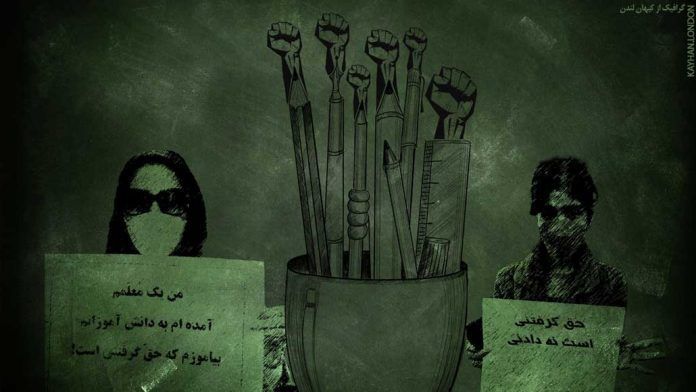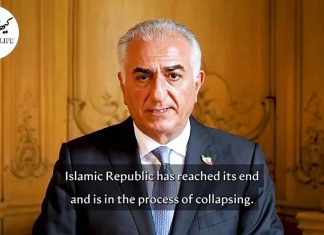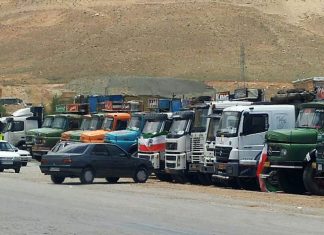The recent demonstrations by employees of the Iranian judiciary are a watershed moment for opponents of Iran’s government, according to Amir Etemadi, a member of the Washington-based pro-democracy group Farashgard.
In an unusual development, Iranian government employees have been staging protests in recent days. Hundreds of staff from the judicial branch demonstrated outside Tehran’s parliament on Jan. 9 against a government U-turn on wage hikes.
Employees of the Judiciary in Their Protest Rally in Front of the Islamic Republic Parliament
A video published by the reformist newspaper Shargh appeared to show civil servants saying that that they would shut down the justice system if they did not get a pay rise. On Jan. 10, Iran’s Attorney-General Mohammad Jafar Montazeri responded by threatening to launch criminal proceedings against the protestors.
“When government officials take to the street to protest for a better life, it shows us that the regime is not even capable of satisfying its own people,” Etemadi told Kayhan Life. “It shows that the regime has reached its weakest point.”
“Anti-government protestors in Iran have not been able to bring about change, because their activities are not coordinated,” he added. “A united force could connect and organize these mass protests in a much more powerful way,” Etemadi said.
Political protests are spreading all over Iran, with angry demonstrations by factory workers, teachers, government employees and human-rights activists. Yet regime change is unlikely in 2022, said Cathryn Grothe, a Middle East and North Africa research associate at Freedom House, a Washington-based non-governmental oganization.
“Isfahan’s Bloody Friday”: Iran Cracks Down On Protests Over Water Shortage
“Iran’s Supreme Leader [Ayatollah Ali Khamenei] is holding power so tightly over the political sphere,” Grothe told Kayhan Life. “Everyday tools of oppression which the government uses reduce the likelihood of upheaval further.”
“Iran is not being held accountable internally or by the geopolitical international community,” she added. “As a result, I think there will be a continuation of what we’ve seen previously: violent responses to protests by security forces, more arrests and internet shutdowns.”
SPECIAL REPORT- Iran’s Leader Ordered Crackdown on Unrest: “Do Whatever It Takes to End It”
Human Rights Should Be Core Focus of Iran Nuclear Talks, Says Activist Mohammadi
Grothe also noted that Iran’s use of internet blackouts during anti-government protests was highly unusual and not observed elsewhere in the Middle East and North Africa.
“The frequency with which the Iranian government resorts to closing down the online space is certainly unique to Iran and is something we’re going to continue to see over the next 12 months,” Grothe said. “The Iranian government often resorts to shutting down the internet to prevent people from organizing protests and mobilizing online.”
Tech Companies Operating in Iran Could Be Enabling Human Rights Abuses, Expert Warns
Anti-government demonstrations in Iran have risen sharply since 2009, as economic mismanagement, US sanctions and the COVID-19 pandemic have plunged the country into its worst crisis in decades.
Across Iran, oil industry and factory workers, teachers, pensioners and human rights activists have called for access to fresh water; better pay and standards of living; the implementation and enforcement of human rights laws; and an investigation into government corruption.
Nationwide protests in November 2019 — sparked by rising fuel prices — led to a violent crackdown by security forces in which at least 1,500 people were killed and an estimated 7,000 were arrested. During the protests, the Iranian government ordered a total internet shutdown. The blackout — which lasted for 10 days in some parts of the country — remains the longest on record.
International leaders and human rights organizations have strongly condemned the Iranian government’s use of deadly force and internet blackouts during peaceful protests. Iran has also been criticized for its failure to investigate alleged human rights violations by its security forces during the protests.
Internet Blackouts Endanger Lives of Iranians, Says NetBlocks Founder
An investigation published in September by Filter Media — an internet watchdog run by London-based digital rights organization Small Media — found that there had been at least five instances of localized internet shutdowns during protests in Iran since November 2019.
Iranian teachers demonstrated on Jan. 13 to demand better working conditions and higher salaries. The nonviolent protests took place across several cities including Tehran, Isfahan, Mashhad, Rasht, Shiraz and Qom. Video footage shared on social media appeared to show security forces beating and arresting teachers.








